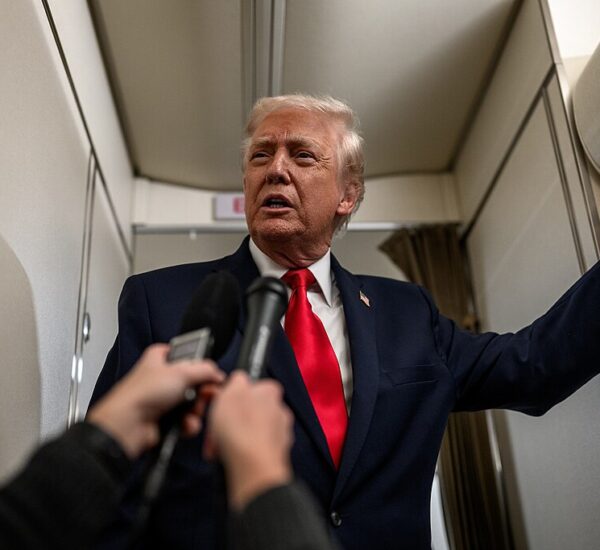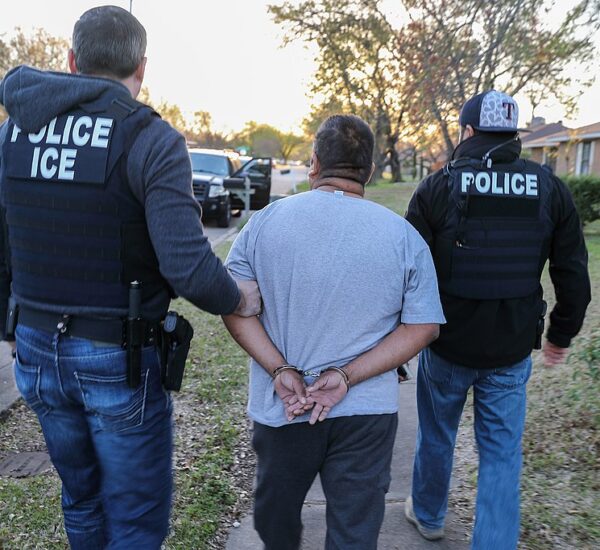GOP Senators Reject Trump’s Decision
Washington, D.C. — President Donald Trump is once again shaking up the establishment with a bold new plan to address America’s growing crime crisis: send violent, repeat offenders—yes, even U.S. citizens—to overseas prisons like the massive CECOT facility in El Salvador. Trump says the idea could save American taxpayers billions while ensuring justice for victims. But some Republican lawmakers are raising constitutional concerns, highlighting a deepening debate inside the GOP over how far the justice system should go to protect law-abiding citizens.
🇺🇸 Trump’s Plan: Send the Worst Criminals Abroad
In a move that’s generating buzz across the country, President Trump recently floated the idea of outsourcing prison space for convicted American criminals. Speaking alongside El Salvador’s President Nayib Bukele, Trump praised the nation’s 40,000-inmate mega-prison and even joked about building “five more” to house U.S. inmates.
Bukele didn’t laugh. In fact, he welcomed the idea—publicly offering to house violent American criminals in exchange for a modest fee. The offer, he said, would help keep El Salvador’s prison system financially stable.
“We’re talking about career criminals that are horrible people that we house and have to take care of for 50 years,” Trump said. “We need real solutions.”
⚖️ GOP Senators Push Back: ‘You Can’t Deport a Citizen’
Despite support among Trump’s base, some Senate Republicans are urging caution. Sen. Chuck Grassley (R-Iowa), a longtime constitutional watchdog, made his position clear: “It sounds to me like you can’t deport citizens.”
Sen. Rand Paul (R-Ky.) added, “I don’t think you can incarcerate a citizen in another country, either,” expressing skepticism about whether such a policy would hold up in court—even under a conservative Supreme Court.
Sen. Ron Johnson (R-Wis.), typically a strong Trump supporter, agreed. “I doubt that would be constitutional,” he said.
💰 Taxpayers Footing the Bill for Repeat Offenders
Trump’s proposal stems from growing frustration among conservatives about the cost of housing violent criminals—especially those who spend decades cycling through the U.S. prison system. He argues that it’s time to stop wasting billions in taxpayer money on “the worst of the worst.”
“We have crime rates under Biden that went through the roof,” Trump said. “We’ve got to bring those rates down.”
🧑⚖️ Due Process for Migrants? Trump Isn’t So Sure
In a separate interview, Trump questioned whether illegal immigrants deserve the same legal protections as American citizens. When asked if deporting migrants without due process would hold up legally, Trump said, “I’m not a lawyer. I don’t know.”
He added, “We’d need millions of trials. We have thousands of people that are murderers, drug dealers, and some of the worst people on Earth.”
GOP senators like Sen. John Thune (R-S.D.) acknowledged that the issue would likely land in the Supreme Court. “The Bill of Rights has something to say about this,” he noted.
Still, Trump remains confident that his legal team will ensure everything is by the book:
“I have brilliant lawyers that work for me, and they are going to follow what the Supreme Court said,” he assured.
❓ Frequently Asked Questions (FAQs)
Q: Can the U.S. legally send citizens to foreign prisons like CECOT in El Salvador?
A: Constitutional experts and GOP senators say it’s unlikely. U.S. citizens are protected by due process rights under the Fifth and Fourteenth Amendments.
Q: Who would be affected by Trump’s proposed plan?
A: The plan targets career criminals and repeat violent offenders, particularly those with long sentences who are costly to house.
Q: Is this proposal part of Trump’s 2024 or 2026 policy agenda?
A: While not a formal plank yet, Trump has publicly floated the idea multiple times, including in interviews and meetings with foreign leaders.
Q: What are conservative concerns about due process for migrants?
A: Some conservatives argue that the immigration court backlog is being exploited and that deporting dangerous criminals should not be delayed by legal technicalities.
📢 Final Take
President Trump’s proposal to send hardened criminals overseas may be legally complex—but for many Americans, it signals bold leadership in a time when crime, open borders, and taxpayer burdens are front and center. Whether the courts will allow it or not, one thing is certain: Trump is once again forcing Washington to confront the issues most Americans care about.







“Does Trump Deserve A 3rd Term?”
this is NOT the question to ask as it is irrelevant. the Constitution says “No”. so that’s it. [period] regardless of whether or not we could use him to be in office for a 3rd term, the Constitution MUST BE HONORED as it is the supreme law of the land. if we make exceptions with regards to when we follow (or not follow) the US Constitution, then anarchy rules. if there is a problem with the wording of the 22nd Amendment, then it needs to be modified BEFORE we can open the door to a 3rd term. keep in mind that if we allow this to happen just to have President Trump remain in office for a 3rd term, then that opens the door to allowing future presidents to violate the 22nd Amendment as well. can you imagine having someone like biden in office for more than 2 terms?? !!